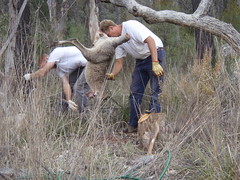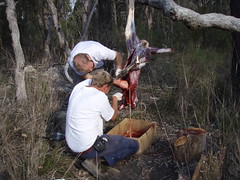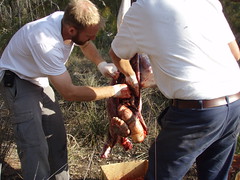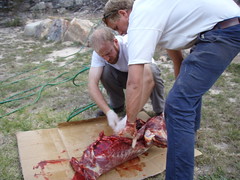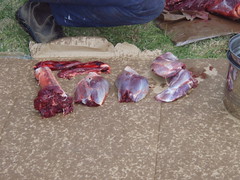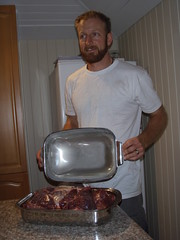For the past few weeks, here at Rivertree, Jesse and I have been working really hard on puttting in part of a permanent food production system (big garden) that has taken much of our energy. During this process, which is near completion, we have had lots of opportunities to practice skills in growing and catching our own food. It can be a bit of work ,in the begining, learning how to eat really well but for us there is no better feeling than knowing where our food comes from. Our dream, is that one day we have an established living system, outside our home, that provides us with all of our most basic needs. For now we settle for whatever we can get.
The following is a summary of our efforts at outsourcing the grocery store in the past weeks. It hasn't been all that much so far but the potatoes are coming along and new veggies are planted everyday. Jesse spends about 4-8 hours a week in the garden which, he claims it's the best part of his day.
WARNING FOR PEOPLE WHO DON'T EAT ANY MEAT THERE ARE PICTURES OF BUTCHERING.
Jesse's first rabbit caught using a wire trap that goes over the head when they come out of the hole. They are a many, and we like to eat meat so it is a useful experience in learning to catch them. As a young boy Jesse's Grandfather taught him catch gofers using a wire trap. The wire trap is a low cost low effort technology and a dozen traps can be set in less than half an hour. With a quick check a couple times a day there are no guns and no sitting and waiting.
The rabbit turned out really well. It was totally free tasty and healthy. We have not tried to catch another since, as we have had a freezer full of kangaroo meat.
One morning while Jesse and Freddy were driving home they hit a Roo or Walabee?? We call him a Roo. You really have to pay attention out here when you drive because the Roos cross the road in front of you very suddenly. Usually it is impossible or dangerous to stop. Most people have a large bar across the front of the vehicle in order to deal with this situation and it is very common where we are to see dead Roos on he side of the road because sometimes they are really big.
The Roo was still alive with both or one of the legs broken. Jesse did the best he could to bring the animal to peace quickly. Leaving Roo on the side of the road to rot was not an option (although you drive by a lot of that) because he was not too banged up so definitely edible. This is Jesse and Fredrik tying up Roo, like we had seen in pictures on the net.
It is what it is...skinnig and gutting. They are doing the best they can, because neither has worked with a large carcass before. They mention that having the experience with the rabbit, also a first, helped. Baby steps!!!
Figuring out where or how to take the guts out was interesting....but it all fell out in the end. I think at this point they were trying not to hit the bladder. This was really hard to watch. however, it was really important to participate as much as I was capable. Having this intimate connection with my future food was a new and difficult experience for me but I feel lucky to have had an opportunity to learn.
Jesse and Freddy trying to work it all out and I am on the sidelines with a piece of paper from the interent helping them find the different cuts on the carcass. In the end they improvised.
We were not sure how to butcher up the meat and the directions from the internet weren't really helping out so Freddy and Jesse cut what they thought was edible nice undamaged meat. We all thought it looked like stuff we had seen at one point in life and then we proceeded to wash and freeze it. We covered all the meat in olive oil and lemon juice then packaged for use in future meals. The meat was still really warm when I was handling it and I felt a little strange about it. I also felt pretty excited when I thought about how healthy and beautiful the meat looked. This meat has given us great tasty dinners such as two very good stews, tacos, sheppards pie, steaks and given much to cutting meat costs. We find it is best in a stew or simmered for a while for flavor and tenderness.
This is all the meat together before we separated it and it is quite a bit of food. We have not hit a Roo since and definitely work to avoid it, but if it happens again this is what we will do. It was really hard the first time, because we had no previous experience.
This is the garden at the front of the house we are living in, it is only a temporary living quarters, as we wait for the house on the land to be completed. When we arrived, the garden was mosty "weeds" some lavader bushes and a few agapanthus plants. The soil was a sad sight of decade granite sand. The house at the land was still months from completion and no location had yet been selected for the garden. We could not really say that we where pursuing permaculture without a veggi garden. We planned to make this little dust hole into our garden straight away. Jesse has done a couple gardens in the past and I have had little experience with any and this looked like a real challenge. Nothing like the rich black soils of the Fraser Valley.
Jesse did a fantastic job in coverting our dry little sandy space into a productive plethora of greens to eat. It is challenging with, little water and basically sand as your soil. Heavy mulching was required and regular fertilizing with a diluted manure tea. The garden has required a modest level of outside resource, but we need a quick result at this temporary location. He did a really good job and at this point we don't need to buy too many greens. With three people to feed it takes a bit of time and practice to get it right. The price of vegi's is a lot higher here than back home, but the most important thing is that we are getting nutrition not normally found in store bought veggies. We have heard that the sure fire best way to live a long and health life is to eat as much food from your yard as possible.
We put all the food out to give an idea of what we are able to harvest from the garden on a regular basis. It is not an everyday thing but a few times a week we can have a really nice salad with heaps of goodness. This is chard, three types of letucce, beet tops, cabbage and broccoli leaves, dill, basil and sage. Tasty treat!!
Whenever we have had a couple of days off we have taken the opportunity to go to the coast and do some surf fishing. It is a lot differrent than any kind of fishing we have back home and a bit of relax vacation time from the farm.
Whiting are one of the fish that you can catch at this time of year as well as bream and flatheads. Compared to fish caught commercial offshore these fish are extremly low effort sources of protein. We are told by locals that winter is the main fishing season and we are at the beginnning of spring heading into summer. They are still around but it takes a bit more time, standing on the beach. Well worth the wait though, this morning Jesse caught two Whiting that were as awesome tasting as any we have had. Other than bait and a licence (which are both cheap )you can fish to your hearts content. The only thing you have to look out for is the sun because if you are out there all day it can take its toll.
Just want to highlight the website http://www.pfaf.org/ fantastic resource for some quality info about plants...permaculture perspective of course.
Will run-away climate change make drought permanent?
18 years ago


